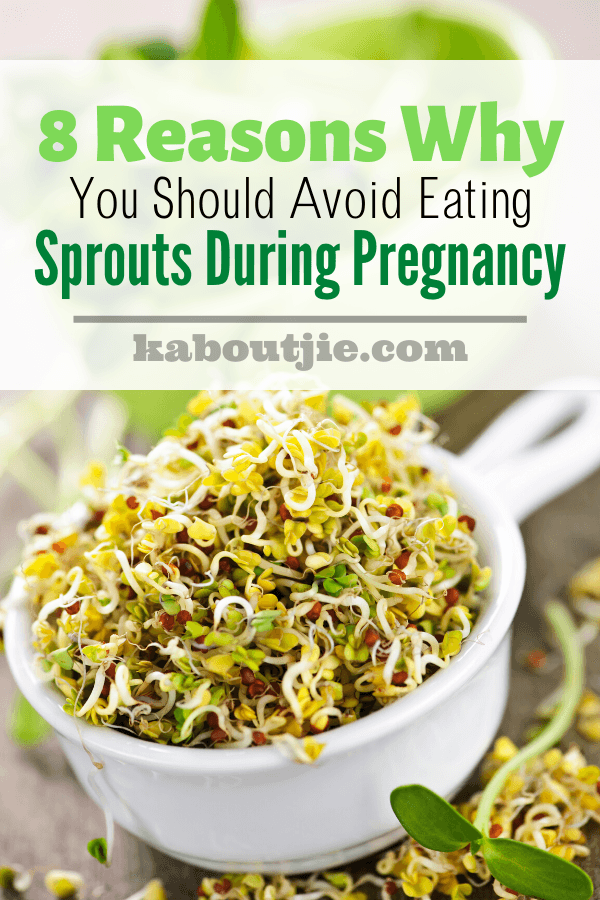Sprouts are germinated seeds which have become young plants. The seeds are usually soaked for several hours after which they are exposed to the right combination of moisture and temperature and then allowed to grow for 2-7 days. This is called the germination process. The end result is usually a sprout that measures between 1/8 to 2 inches (2-5 cm) long.
***Disclosure -The links in this post may contain affiliate links and I may receive a small commission if you make a purchase after clicking on a link.***

You can sprout many different types of seeds.
These are among the most common types available for purchasing:
- Nut and seed sprouts – Alfalfa seed, Almond, Radish seed, Sesame seed, Pumpkin seed & Sunflower seed
- Vegetable or leafy sprouts – Broccoli, Mustard green, Radish, Cress, Fenugreek sprouts, Beet & Clover
- Bean and pea sprouts – Garbanzo, Kidney beans, Green peas, Adzuki, Mung beans, Snow pea sprouts, Soybeans & Black beans
- Sprouted grains – Brown rice, Oat sprouts, Buckwheat, Kamut, Amaranth & Quinoa
Sprouts are eaten raw in general but can be lightly cooked in a casserole or stir-fry before consumption.
Advantages of eating raw sprouts and the potential risks
Many people love eating sprouts as they contain many nutrients and are believed to improve blood sugar levels and digestion as well as keeping heart disease at bay.
On the other hand, sprouts are often linked to cases of food poisoning which make people think twice before eating them due to the potential risks especially the consumption of sprouts during pregnancy.
With this being said, for most people that follow a healthy lifestyle, the health benefits of eating lightly cooked or raw sprouts outweigh the risks.

What you should know about sprouts
- Do they carry the risk of illness?
Just like any other fresh produced which is eaten partially cooked or raw, sprouts have the potential of carrying foodborne illness. However, unlike other types of fresh produce, beans and seeds need humid and warm conditions to grow and sprout. These conditions are favourable breeding grounds for bacteria such as E. coli, Listeria and Salmonella.
- Are sprouts linked with outbreaks of foodborne illness?
There have been at least thirty reported outbreaks of foodborne illness since 1996 which have been linked to several types of slightly cooked and raw sprouts. Most of these outbreaks were due to E. coli and Salmonella.
- What is the cause of this bacteria?
In Outbreaks which are connected with sprouts, seeds are predominantly the source of the bacteria. There are approved techniques for eliminating harmful bacteria present on the seeds and tests can be done during sprouting. But, there is no guaranteed treatment available for getting rid of all bacteria.
- Are home-grown sprouts a safer choice?
Not essentially, if only a few traces of harmful bacteria are present on or in the seed, the bacteria can expand to high levels when sprouting, even under the best sanitary conditions at home.
- What safety measures can be implemented in Industry to safeguard the consumption of sprouts better?
During 1999, the FDA has provided companies in the Sprout Industry with guidance as to what they can do to reduce the risk of contaminated sprouts with harmful bacteria. And even today, the FDA and other state agencies are continuing to work on strategies to detect and reduce contamination as well as keeping polluted sprouts out of the market place.
- What can we as consumers do in reducing the risk of illness?
- People with weakened immune systems i.e. elderly, children and pregnant women should avoid consuming raw sprouts, including alfalfa, mung bean sprouts, clover and radish.
- Make sure sprouts are thoroughly cooked to reduce risk of illness. Cooking eliminates harmful bacteria.
- When you’re eating at an establishment or other people’s homes, make sure you request that no raw sprouts are added to your food. When purchasing a salad or sandwich at a delicatessen or restaurant, check and make sure no raw sprouts were added.

Negative effects when eating sprouts during pregnancy
- Alfa-alfa can cause complications due to e-coli bacteria.
- As Salmonella can multiply very quickly, a single sprout can contain an infectious dose.
- Clover, radish and beans are some specimens of raw sprouts that have been reported to cause salmonella due to bacterial contained in them.
- You have a high likeliness of contracting disease when eating contaminated seeds.
- Women are especially cautioned to steer clear of eating raw sprouts during pregnancy after the salmonella outbreak cause by alfa-alfa.
- Even though the seeds remain inactive in dry conditions, once sprouted in warmer conditions, the development of bacteria are activated.
- Pregnant women are more prone to getting Salmonella which include symptoms of cramping, diarrhoea, nausea and fever.
- The bacteria are highly likely to be transmitted to your unborn baby and it may also result in fever, meningitis and diarrhoea in the fetus.
Tips for staying on the safe side when experiencing sprout cravings during pregnancy
- If you are craving sprouts during pregnancy, stick to small amounts
- Make sure they are rinsed thoroughly to remove all traces of bacteria.
- Make sure they are cooked and not raw.
- If your immune system is weakened they must be avoided completely as you are more prone to developing foodborne diseases during this time.
Strategic guidelines for buying sprouts during pregnancy
- Make sure you are buying sprouts which are fresh and kept in the refrigerator.
- Avoid buying skinny-looking sprouts or ones that smell musty.
- When at home, keep the sprouts at a temperature which is below forty degree Fahrenheit.
- Make sure your refrigerator is clean.
- Before using sprouts, rinse and clean them properly.
- Cooking sprouts lowers the risk of contracting food borne diseases.
- Cooked sprouts can be added to dishes such as stews, fries and soups.
- If they are baked in the oven, keep tossing them around until they are crisp and brown.
Conclusion:
There is no question about the fact that sprouts are nutrient rich and can be a healthy choice, but you must be cautious when preparing and cooking them before consumption to keep food poisoning at bay. During pregnancy, it is better to avoid them all together.
Ask your doctor if you are planning to eat sprouts. He is familiar with all the ins and outs of your health during your pregnancy and can advise you accordingly.
 Kaboutjie SA Mommy Blogs by Lynne Huysamen
Kaboutjie SA Mommy Blogs by Lynne Huysamen





At times like these. Google is my best friend ❤️
Thank you this was really informative.